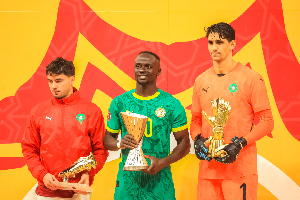At a recent programme organized by Legacy and Legacy, Pastor Mensa Otabil, the General Overseer o the ICGC spent between five and 10 minutes in what clearly indicated a direct ‘bastardising’ of a favourite delicacy in Ghana, fufu. Though he acted like talking about Africa’s evolution and how he thought the continent was backward in thinking, his attention was on fufu.
In our traditional setting it is normally assumed that the elderly never make a mistake and that everything they said or would say was right.
This went on for a while but due to evolution, that idea has been debunked. By the same evolution, I can emphatically say Pastor Mensa Otabil of the ICGC got it ALL WRONG when he attempted to ‘bastardise’ fufu.
At every step of his attempt to justify his statement about fufu being a ‘killer’ in Africa, he got everything wrong.
I thought he would have used the occasion to tell these young people to be innovative as to take the things we, as a nation have, which he feels needs some evolution and work on them to make them better but to condemn the whole aspects of fufu at a seminar where these young people should know better was unfortunate.
Wrong Assertion One
Pastor Otabil asserted that Europeans have evolved and no more eat with their hands so we should do same.
It was these unfortunate communication that deceived us into exchanging our cooking in ‘Kukuo” (earthenware pots) to metal pots; stopped us from grounding pepper in the ‘Ayowa’ (earthenware bowl) to using blenders; stopped us from harnessing the importance and usage of ‘?ta’ (wooden ladle) to preferring silverware. Studies are showing that some cookwares are polluting the body. With stainless steel, there are many grades.
Regular stainless steel cookware is made from different alloys including scrap metal. Most stainless steel sold in stores is of such a nature to allow chrome and nickel to bleed into the foods as the salts and acids of the food react with the metal cookware.
This is according to Dr. Herbert Shelton, who’s publication known as Dr Shelton’s Hygienic Review has been adopted and practiced worldwide. According to Dr Shelton, cast iron is the most porous of all metals. Grease can turn rancid in pores.
Some people believe that they can get iron from a cast iron pot. The reality is that iron comes in a ferrous and a ferric form. ‘Your body cannot assimilate the iron (ferric) from a cast iron pan.’ Have you studied how we produce iron pots here? The so called ‘non-stick’ cookware touted to be one of the best can scratch, chip and flake.
“Exposure to teflon resins at temperatures above 393ºF (200 ºC) may produce a condition termed polymer fume fever characterized by flu-like symptoms such as chills, fever, body aches, nausea and occasional vomiting.”
Federal Aviation Agency Occupational Health & Safety Bulletin In Ghana almost all households use aluminum cookware. According to Dr. A. McGuigan’s Report on Findings for the Federal Trade Comm. Aluminum is a very soft metal.
It produces extreme chemical reaction between food and pan. “All Vegetables cooked in Aluminum produce hydroxide poison which neutralizes digestive juices, producing stomach and gastrointestinal trouble, such as stomach ulcers and colitis.”
Today, the sale of aluminum cookware is prohibited in Germany, France, Belgium, UK, Switzerland, Hungary Brazil and counting. The last check I had on the cost of best cookware in Ghana where in most cases, you do not need oil to fry; water to boil and still get the very natural taste of the food was $7,000.
That is for the few equipment a family of about three can use. If one had more than that then one needed about $14,000 and above to have all that one needed to stay safe. I will prefer using my hands to eat than to use a metal which can deposit some residue into my system and cause more complications than anything.
If hands are dirty, let’s teach people how to keep them clean. Why are we running away from responsibilities?

Wrong Assertion Two
This workshop is a yearly event organized to motivate the youth to be entrepreneurially minded and to start looking at opportunities for innovations.
So this fufu matter that took centre stage was untenable. Especially when the message seems not intended to specifically come up with an idea to innovating new and better ways of either preparing or consuming fufu. Remember these were not engineering students as well.
The assertion by Pastor Otabil that he made a personal vow not to eat fufu, because the mortar in which it is prepared is not hygienic, was his own decision taken after having enjoyed the meal for possibly a long time. He is just an individual and fufu eating was not started in his time of birth to the time he made the vow to stop.
Fufu is a staple food first to the Asante people and now nationwide – a trend which started with history. Fufu eating will not stop today nor when Pastor is no more.
So he making a vow to stop eating fufu should not be an issue – at such a workshop – at all. Mortars being kept clean or not are individual doings. Yes it is true some households may not be keeping the mortars clean but most households do manage these things very well. So if he made that vow based on what he had experienced, it should not be made to sound as if all Ghanaians and by extension Africa has such a problem.
One thing he couldn’t tell the ‘ready-to-be-entrepreneurs’ was what the mortar and pestle are made of and how they may just look like pounding and making the fufu but in essence have some values yet unexplored.
The pestle and mortar are made of some specific species of wood which are very valuable and yet to be explored. Some few examples:
Kusia (Nauclea diderrichii): The tree is used for food in Ghana, as an ingredient of palm soup. Both bark and leaves can be used as a medicine to treat stomach-ache and measles respectively.
The timber is suitable for outdoor use such as harbour and railway constructions, mortars, telephone poles, mine shafts, furniture and drums as well as bridges and fence posts.
Ofram (Terminalia superba): Products from the bark and leaves have medicinal value treating all sorts of diseases, from malaria to diarrhea.
It is used for light construction, flooring and shipbuilding but also in smaller objects such as matches, toys and musical instruments. It can also be used as firewood or for charcoal production.
Awiemfosamina (Albizia ferruginea): The leaves are eaten by goats.
The trees are used to produce charcoal and in Ghana, for mortar whiles parts of the tree are used to treat dysentery.
The leaves that fall improve the soil fertility around cocoa trees. Because of the aesthetical value of the tree, it is often planted along avenues or in parks
Danta or Akumaba (Nesogogordonia papaverifera/Cistanthera papaverifera (Sterculiaceae family): A strong, heavy, attractive redwood, the Danta is fine-grained and hard wearing with medium lustre.
It is used for interior and exterior applications such as high quality joinery, cabinet work, bench tops, boat components, turnery and decking etc. It is also used for making mortars and sometimes as a substitute for chewing sticks.
This is what Pastor Otabil failed to tell the participants so they could have gone back home, think through issues and come to a conclusion as to how they could evolve and bring innovation into making the mortar more attractive and possibly hygienic. Remember the recent fufu ‘grounding’ machines in the system can be more dangerous than using a mortar of medicinal value.

Wrong Assertion 3
Maybe what Pastor Otabil failed to appreciate was his comments’ effect on our economy.
As said earlier, the higher grade stainless steel for which every man can boast of ‘eating to live well’ is from the lowest cost of $7,000, how many Ghanaians can afford that? Suffice to say Ghanaians can afford, who is being made richer? As we speak, there is one operational manganese ore mine in Ghana, Nsuta-Tarkwa, in the Western Region, utilising an opencast, strip-mining method. In 2006 the mine produced 1.6m tonnes, of which 52% was exported to Ukraine, 37% to China, and the remainder to Norway.
The Ukrainian Private Group now possesses managerial rights to the Ghana Manganese Corporation (GMC), to ensure stability of supply. Manganese mining began in Ghana as early as 1916, we are still carrying the raw stones abroad for them to extract whatever they need from it and what are we left with? Diseases! Studies have shown that Manganese is toxic, and known to cause ‘manganism’. This irreversible neurological condition produces symptoms similar to Parkinson’s disease, in which patients exhibit impaired responses, mood swings, irritability, and repetitive behaviours similar to OCD. The effectiveness of medical treatment decreases after three years, and prolonged exposure increases the severity of symptoms.
Secondly, Manganese causes poisoning via the air if there is an ambient concentration of over 5mg, which is a particular risk due to the open-cast method. Manganese can also be water-borne, and poisoning can occur if wells and boreholes become contaminated, with children being especially vulnerable.
Maybe Pastor Otabil would have done us a lot of good if he had made these information available to the would-be entrepreneurs who in turn would come up with innovative ideas than attacking fufu and declaring fufu as a killer in Africa. Conclusion Why was it fufu? Why not the filth engulfing us? Right around ICGC, Christ Temple, we see some near chaos.
Why not proffer ideas on how we can be innovative with the filth engulfing, killing and maiming us? It is time that Ghanaians who have some influence like Pastor Otabil speak for Ghana and not do and say things that undermines the integrity of the same system which has created an enabling environment for some to flourish. Pastor Mensa Otabil, the ATTACK ON FUFU was unfortunate and YOU WERE WRONG.
Opinions of Friday, 3 March 2017
Columnist: 3news.com















